So, we’re looking at how LGBTQ+ rights stack up in places where most people are Muslim versus in Western democracies. It’s a pretty complex topic, and honestly, it’s easy to get things mixed up. You hear one thing, then another, and it’s hard to see the whole picture. This article tries to break down some of the trends and differences we’re seeing globally, especially when we’re Comparing LGBTQ+ Rights in Muslim and Western Countries. It’s not about pointing fingers, but more about understanding what’s happening on the ground and why.
Key Takeaways
- LGBTQ+ rights have become a symbol of modern democracies, but progress hasn’t been smooth, even in Western countries where battles for equality continue.
- In many Muslim-majority nations, cultural views on sexuality and gender are often seen as a defense against perceived Western influence, leading to varying legal restrictions for LGBTQ+ individuals.
- Globalization and modernization don’t automatically mean better LGBTQ+ rights everywhere; some highly developed Muslim-majority countries might actually resist outside pressure more effectively.
- Factors like political systems, religious interpretations, traditions, and even economic development play a big role in how LGBTQ+ rights fare in different parts of the world.
- Effective advocacy for LGBTQ+ rights, especially in Muslim-majority contexts, needs to be locally led and sensitive to avoid being seen as foreign imposition, focusing on challenging laws and building social acceptance.
Global Trends in LGBTQ+ Rights
The Rise of LGBTQ+ Rights as a Democratic Hallmark
It’s kind of wild to think about, but over the last few decades, LGBTQ+ rights have really started to be seen as a sign of a healthy democracy. Like, if a country is doing well with these rights, it’s often seen as a more modern, inclusive place. It’s a big shift from how things used to be, where this stuff was barely on the radar, if at all. This whole movement has become a pretty big deal in how we talk about what makes a country truly democratic and fair for everyone.
Challenges to Egalitarian Pluralism
But it’s not all smooth sailing, right? Even in places that seem pretty progressive, there are still hurdles. Sometimes, even when laws change, old attitudes stick around. It feels like a constant push and pull. We see this in how different groups might be included or excluded, and it makes you wonder how truly egalitarian things are. It’s a complex picture, for sure.
Resistance to LGBTQ+ Rights as a Global Phenomenon
What’s really interesting, and honestly a bit concerning, is that pushback against LGBTQ+ rights isn’t just happening in one or two places. It’s a global thing. You see it popping up in different countries, sometimes in surprising ways. It feels like there’s a coordinated effort in some areas to push back against these advancements. It makes you think about why this is happening and what’s driving it. It’s definitely not a simple issue with easy answers.
Here’s a quick look at some of the trends:
- Decriminalization Efforts: Many countries have moved to decriminalize same-sex relations, but significant numbers still have laws against it.
- Marriage Equality: While some nations have legalized same-sex marriage, it remains a highly contested issue globally.
- Anti-Discrimination Laws: Progress has been made in enacting laws to protect LGBTQ+ individuals from discrimination, but enforcement and scope vary widely.
The global conversation around LGBTQ+ rights is constantly evolving. While some regions have seen significant progress, others face intense opposition. This dynamic creates a complex landscape for advocates and individuals alike, highlighting the need for nuanced approaches that consider local contexts and cultural sensitivities.
LGBTQ+ Rights in Western Democracies
Historical Progress and Ongoing Struggles
For a long time, LGBTQ+ rights weren’t really on the radar in Western countries. It’s only in the last few decades that we’ve seen significant shifts, with many seeing LGBTQ+ rights as a sign of a healthy democracy. Think about it: women’s right to vote was a huge step towards inclusion, and now, recognizing LGBTQ+ people is seen as another marker of a society that values everyone. But this progress wasn’t handed out; it was fought for by dedicated activists who worked hard to chip away at old ways of thinking that excluded and stigmatized people. Even now, things aren’t perfect. While we’ve made strides in areas like marriage, adoption, and protection from discrimination, there are still gaps, especially for transgender and intersex individuals. The US, for example, only banned laws against sodomy in 2003 and legalized same-sex marriage nationwide in 2015. It’s a slow process, and there’s still a lot of work to do to make sure everyone is truly equal.
Addressing Homonegativity Within Western Societies
It’s easy to think that because Western democracies have made progress, homophobia is a thing of the past. That’s just not true. Anti-LGBTQ+ hate is increasing in Western countries, both online and offline. Researchers see this as a reaction to the progress made over the last twenty years. It’s a complex issue, and sometimes, even within societies that champion equality, you find pockets of resistance. Studies show that a significant portion of the population still holds negative views towards LGBTQ+ individuals. This isn’t just about personal opinions; it can translate into real-world discrimination and even violence. We need to acknowledge that homonegativity exists, even in places we might expect more acceptance. It’s a challenge that requires ongoing attention and effort to change hearts and minds.
Political Measures to Strengthen LGBTQ+ Communities
Given the current climate, it’s really important for Western democracies to actively support LGBTQ+ communities. This isn’t just about being nice; it’s about protecting the very fabric of democratic societies. LGBTQ+ people are disproportionately targeted by hate crimes in Europe, which is a serious warning sign. To counter this, governments can take concrete steps. These might include:
- Passing and enforcing stronger anti-discrimination laws that cover all aspects of life, from employment to housing.
- Implementing public awareness campaigns to educate people and challenge harmful stereotypes.
- Supporting LGBTQ+ organizations that provide vital services and advocacy.
- Ensuring that hate crimes are thoroughly investigated and prosecuted.
The pushback against LGBTQ+ rights is a global phenomenon, often framed as a defense of ‘traditional values.’ This narrative can be used by political actors, even within democracies, to mobilize support by presenting LGBTQ+ inclusion as a threat to national identity or established norms. Recognizing and countering these narratives is key to protecting democratic principles and human rights for all.
It’s also worth noting that while legal protections have advanced, the fight for full equality continues. For instance, the progress made in recognizing same-sex relationships hasn’t always translated into equal rights for transgender individuals. This means that even in countries with strong LGBTQ+ rights frameworks, there are still specific groups facing significant hurdles.
LGBTQ+ Rights in Muslim-Majority Nations
Cultural Perceptions and Perceived Western Threats
It’s complicated, you know? In many Muslim-majority countries, there’s a strong sense that certain cultural values are under pressure from the West. This often gets tied up with LGBTQ+ rights, with some leaders and groups framing acceptance of these rights as a foreign imposition, a threat to traditional family structures and national identity. It’s not just about religious doctrine for everyone; it’s also about a feeling of cultural sovereignty. This perception of a ‘Western threat’ can really harden attitudes and make progress incredibly difficult. Sometimes, even in countries that are quite modern and globalized, this resistance can be quite strong, almost as a way to push back against perceived outside influence.
Varying Degrees of Legal Restriction
When we talk about laws, it’s not a one-size-fits-all situation across Muslim-majority nations. Some countries have really strict laws, even criminalizing same-sex relations with severe penalties, sometimes even the death penalty. Others might not have explicit laws but still enforce public order or morality codes in ways that effectively target LGBTQ+ individuals. Then you have places where the legal situation is more ambiguous, or where there’s a bit more space for activism, though still with significant challenges. It’s a spectrum, for sure.
Here’s a rough look at some legal stances:
| Country | Legal Status of Same-Sex Relations | Penalties |
|---|---|---|
| Iran | Illegal | Imprisonment, flogging, death penalty |
| Saudi Arabia | Illegal | Imprisonment, flogging, death penalty |
| Yemen | Illegal | Imprisonment, flogging, death penalty |
| Nigeria (North) | Illegal | Imprisonment, death by stoning (in some states) |
| Malaysia | Illegal | Imprisonment, fines, caning |
| Egypt | Not explicitly illegal, but enforced via ‘debauchery’ laws | Imprisonment |
| Jordan | Not explicitly illegal, but societal pressure is high |
The Role of Advocacy and Localized Approaches
Despite the hurdles, there are brave activists working on the ground. They often have to be really smart about how they advocate. Pushing too hard or appearing to be aligned with Western agendas can backfire. So, many focus on human rights in a broader sense, or on specific issues like health or safety, rather than immediately demanding full legal equality. Building trust within their own communities and finding allies locally is super important. It’s about making progress in ways that feel relevant and safe for the people living there, not just following an international playbook. Sometimes, this means working within existing cultural frameworks or focusing on decriminalization first, before tackling broader acceptance.
Comparing LGBTQ+ Rights in Muslim and Western Countries
Divergent Trajectories of Rights Development
When you look at how LGBTQ+ rights have progressed, it’s pretty clear things have gone in different directions in Western democracies compared to many Muslim-majority nations. In the West, the last few decades have seen a significant push for legal protections and social acceptance, though it’s been a long road with plenty of bumps. Think about it – same-sex marriage is legal in many Western countries now, and there are laws against discrimination in jobs and housing. It wasn’t that long ago that some of these basic rights were just a dream for many.
The Influence of Globalization and Modernization
It’s interesting how globalization and modernization seem to play a role here. In many Western countries, these forces have often gone hand-in-hand with greater acceptance of LGBTQ+ people. However, in some Muslim-majority nations, there’s a different story. Some reports suggest that as these countries become more connected globally, there’s also a stronger pushback, sometimes framed as protecting local culture or identity from what’s seen as Western influence. It’s like a reaction against perceived cultural threats.
Understanding Resistance to LGBTQ+ Inclusion
So, why the difference? It’s complicated, for sure. In Western societies, the struggle for LGBTQ+ rights has often been framed within broader movements for civil rights and equality. There’s been a lot of activism, legal challenges, and public awareness campaigns. In contrast, in many Muslim-majority countries, resistance to LGBTQ+ inclusion can be tied to deeply held religious beliefs, cultural traditions, and sometimes, political ideologies that emphasize traditional family structures. It’s not just about one thing; it’s a mix of social, cultural, and political factors.
The push for LGBTQ+ rights in Western democracies has often been seen as a marker of a healthy, inclusive society. This contrasts with many Muslim-majority nations where, despite modernization, there can be significant legal and social barriers for LGBTQ+ individuals, often linked to interpretations of religious and cultural norms.
Here’s a quick look at some general trends:
- Western Democracies: Generally moving towards legal recognition, anti-discrimination laws, and marriage equality. Progress is uneven, with ongoing debates and challenges, especially for transgender individuals.
- Muslim-Majority Nations: A wide spectrum exists, from countries with severe penalties (including death) for same-sex relations to those with more nuanced legal restrictions or social stigma. Advocacy often faces significant hurdles.
- Global Trends: While globalization can sometimes promote rights, in some contexts, it has also led to a hardening of positions against LGBTQ+ inclusion, framed as a defense of local values.
Factors Influencing LGBTQ+ Rights

So, what’s really going on when we look at LGBTQ+ rights around the world? It’s not just one thing, is it? A bunch of different forces are at play, shaping how things are for queer folks in different places.
The Impact of Political Regimes and Ideologies
Political systems and the ideas that drive them play a massive role. In countries where democracy is strong and people have a say, you often see more movement towards recognizing LGBTQ+ rights. Think about it: if a government is built on ideas of equality and individual freedoms, it’s harder to justify denying rights to a whole group of people. But then you have other places where the government is more authoritarian, or where certain ideologies are really pushed. In those situations, LGBTQ+ people can face a lot of pushback, and rights can actually go backward. It’s like a tug-of-war between different political beliefs.
Religion, Tradition, and Societal Norms
This is a big one, and it’s complicated. Religious beliefs and long-standing traditions definitely shape how societies view sexuality and gender. In many parts of the world, especially in Muslim-majority nations, there’s a concern that embracing LGBTQ+ rights is seen as adopting Western values, which some people feel threatens their own cultural identity or national sovereignty. It’s not always about religion itself, but how it’s interpreted and used in the public sphere. Sometimes, these interpretations can lead to laws and social attitudes that are really tough on LGBTQ+ individuals. It’s a delicate balance between respecting diverse beliefs and ensuring everyone has basic human rights.
Socioeconomic Development and International Pressure
Money and outside influence matter too. Generally, countries that are more developed and connected globally tend to show more progress on LGBTQ+ rights. This isn’t a hard and fast rule, though. Some wealthier, more globalized Muslim-majority countries might actually have more resources to resist international pressure to change their laws on LGBTQ+ issues, perhaps to protect what they see as their unique cultural identity. On the flip side, international organizations and other countries can put pressure on governments to improve their records on LGBTQ+ rights. However, this pressure needs to be handled carefully; if it’s seen as outside interference or a continuation of past colonial attitudes, it can backfire and actually strengthen resistance.
Strategies for Advancing LGBTQ+ Rights
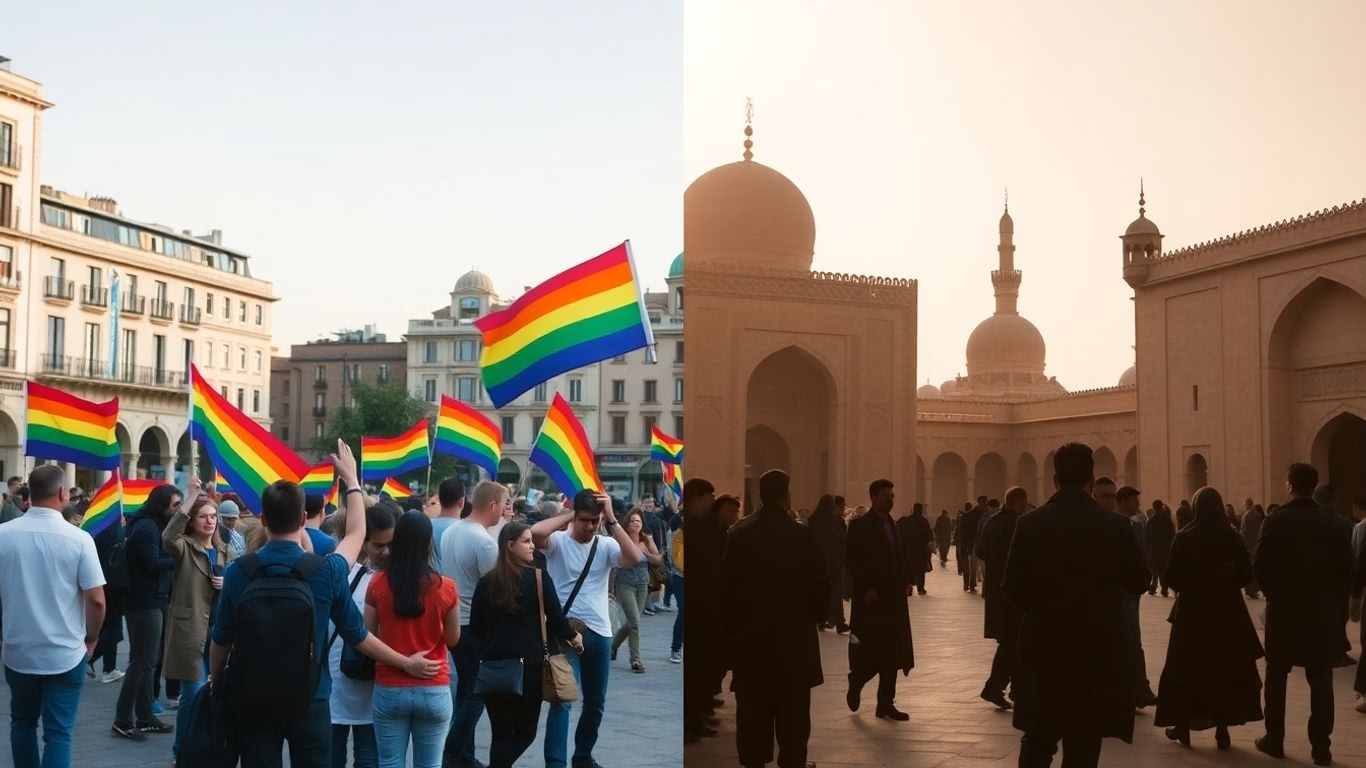
The Importance of Localized Advocacy
Pushing for LGBTQ+ rights globally is tricky business. Sometimes, loud, public calls for change from outside can actually make things worse for people on the ground. It’s like shouting at someone who’s trying to sneak out of a tough spot – it just draws attention. That’s why focusing on what local groups need and want is so important. They know the landscape, the risks, and the best ways to talk about these issues without putting people in danger. Genuine progress often comes from within communities, supported by those who understand the local culture and social dynamics.
Challenging Discriminatory Legal Frameworks
Laws matter, a lot. When laws are written to discriminate, it gives a green light for prejudice. So, a big part of the work involves looking at these laws, whether they’re about criminalizing same-sex relationships or making it hard for transgender people to live openly, and figuring out how to change them. This isn’t just about getting rid of bad laws; it’s also about creating new ones that offer real protection.
- Reviewing and proposing amendments to existing anti-LGBTQ+ legislation.
- Drafting new laws that guarantee equal rights and protections.
- Working with legal professionals to understand the best avenues for reform.
Promoting Social Awareness and Inclusive Spaces
Laws are one thing, but how people think and feel is another. Changing hearts and minds takes time and consistent effort. It means creating spaces where LGBTQ+ people feel safe and accepted, and also educating the wider public. This can involve workshops, community events, and sharing personal stories. It’s about building understanding, one conversation at a time.
Sometimes, the most effective way to support LGBTQ+ communities in places where rights are limited is through quiet, steady work. This means giving resources directly to local activists who are already doing the work, rather than making big public statements that might backfire. It’s about being a partner, not a spotlight.
| Strategy Type | Example Actions |
|---|---|
| Legal Reform | Decriminalization campaigns, anti-discrimination law proposals |
| Social Awareness | Public education campaigns, media outreach, cultural events |
| Community Support | Funding local LGBTQ+ organizations, creating safe spaces, mental health services |
| Diplomatic Engagement | Private discussions with governments, international forums on human rights |
Wrapping Things Up
So, looking at LGBTQ+ rights across different parts of the world really shows us how complex things are. In Western democracies, there’s been a long road, with rights slowly but surely being recognized, though it’s still a work in progress for many. Meanwhile, in many Muslim-majority countries, the situation is often quite different, with rights being restricted, sometimes severely. It seems like a mix of cultural views, national identity concerns, and even how globalized a country is plays a big part. What’s clear is that pushing for change needs to be done carefully, making sure it doesn’t come across as outsiders telling people what to do. Finding ways to support local advocates and respecting different approaches seems like the best path forward, because a one-size-fits-all solution just doesn’t seem to fit here.
Frequently Asked Questions
What does LGBTQ+ stand for?
LGBTQ+ is an acronym that stands for Lesbian, Gay, Bisexual, Transgender, and Queer or Questioning. The ‘+’ is added to include other identities like Intersex, Asexual, and others who are part of the community.
Are LGBTQ+ rights the same everywhere?
No, LGBTQ+ rights are very different depending on the country. In some Western democracies, there has been a lot of progress in recognizing and protecting the rights of LGBTQ+ people. However, in many Muslim-majority nations, LGBTQ+ people face significant legal challenges and social stigma.
Why are LGBTQ+ rights different in Muslim-majority countries compared to Western countries?
This is complex. In some Muslim-majority countries, cultural traditions and religious interpretations lead to stricter laws and social views regarding gender and sexuality. Some also feel that LGBTQ+ rights are being pushed by Western countries and see it as a threat to their own culture and independence. In Western democracies, there’s a stronger focus on individual freedoms and equality, though progress has been a long journey with ongoing struggles.
Is it true that some countries see LGBTQ+ rights as a sign of being a modern democracy?
Yes, in many Western democracies, accepting and protecting LGBTQ+ rights is seen as a sign of a healthy, inclusive society that values everyone. It’s often linked to the idea of modern democracy and treating all citizens equally.
What are some challenges faced by LGBTQ+ people in Muslim-majority countries?
Challenges include laws that criminalize same-sex relationships, difficulty accessing healthcare, social discrimination, and sometimes even violence. In some places, there’s a strong societal belief that being LGBTQ+ goes against traditional values.
How can LGBTQ+ rights be improved in places where they are not well-protected?
It’s important for local groups and advocates within those countries to lead the way. They can work to change unfair laws, raise awareness, and create safer spaces for LGBTQ+ people. It’s also helpful if international support is given in a way that respects local culture and doesn’t seem like outside interference.

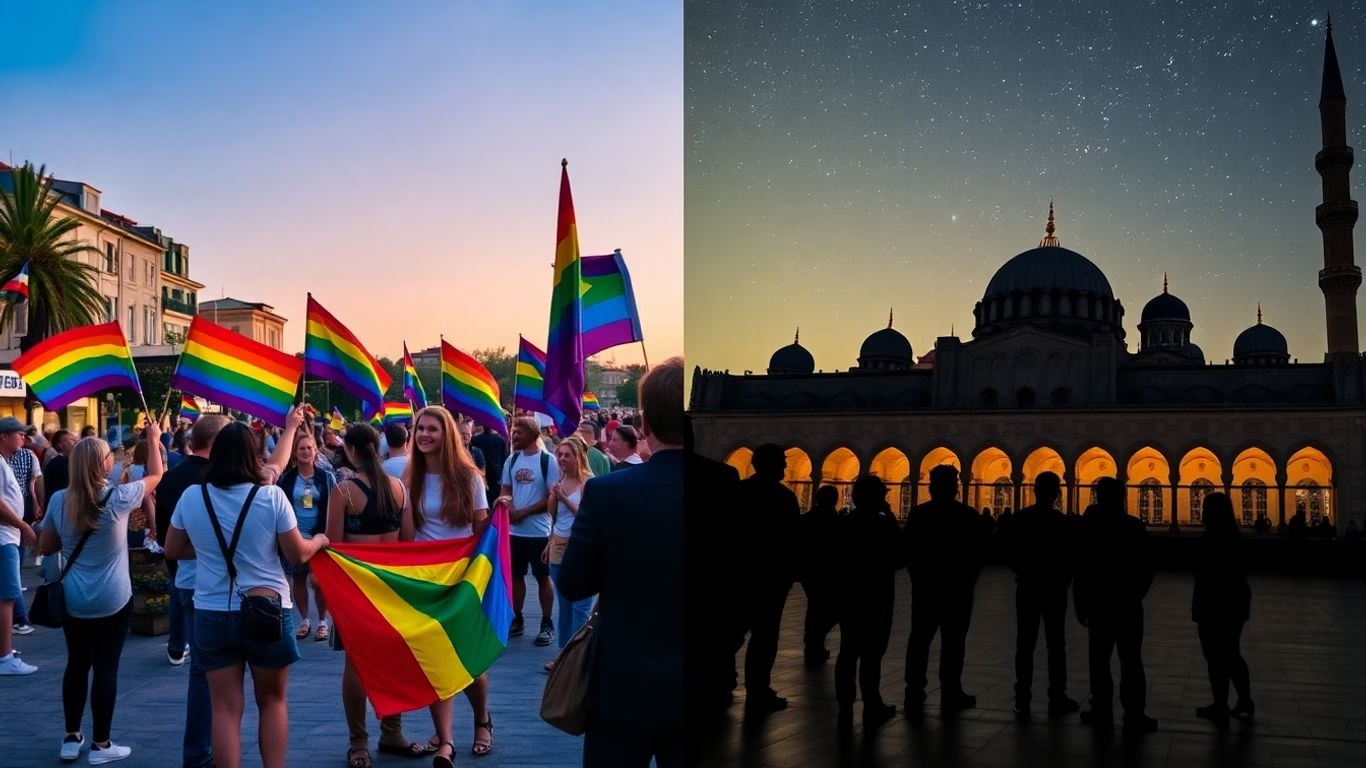
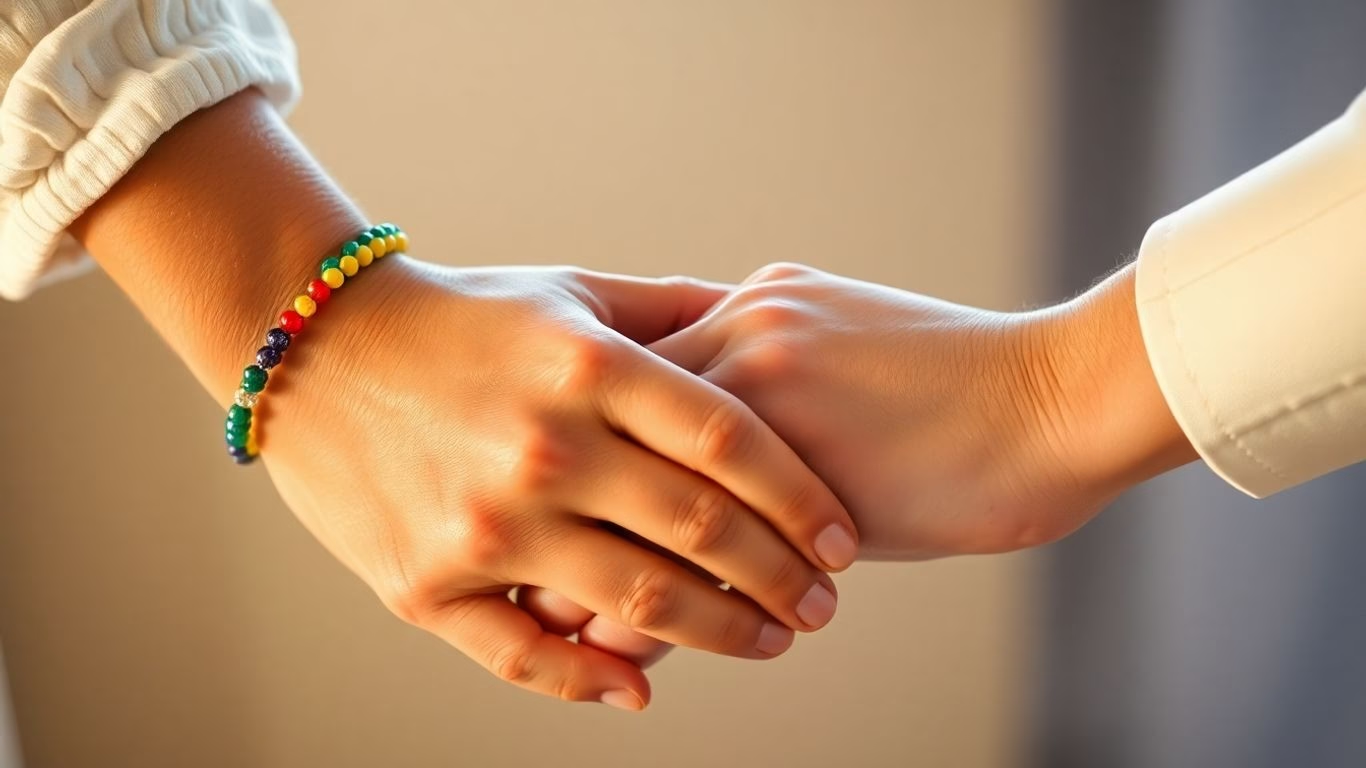
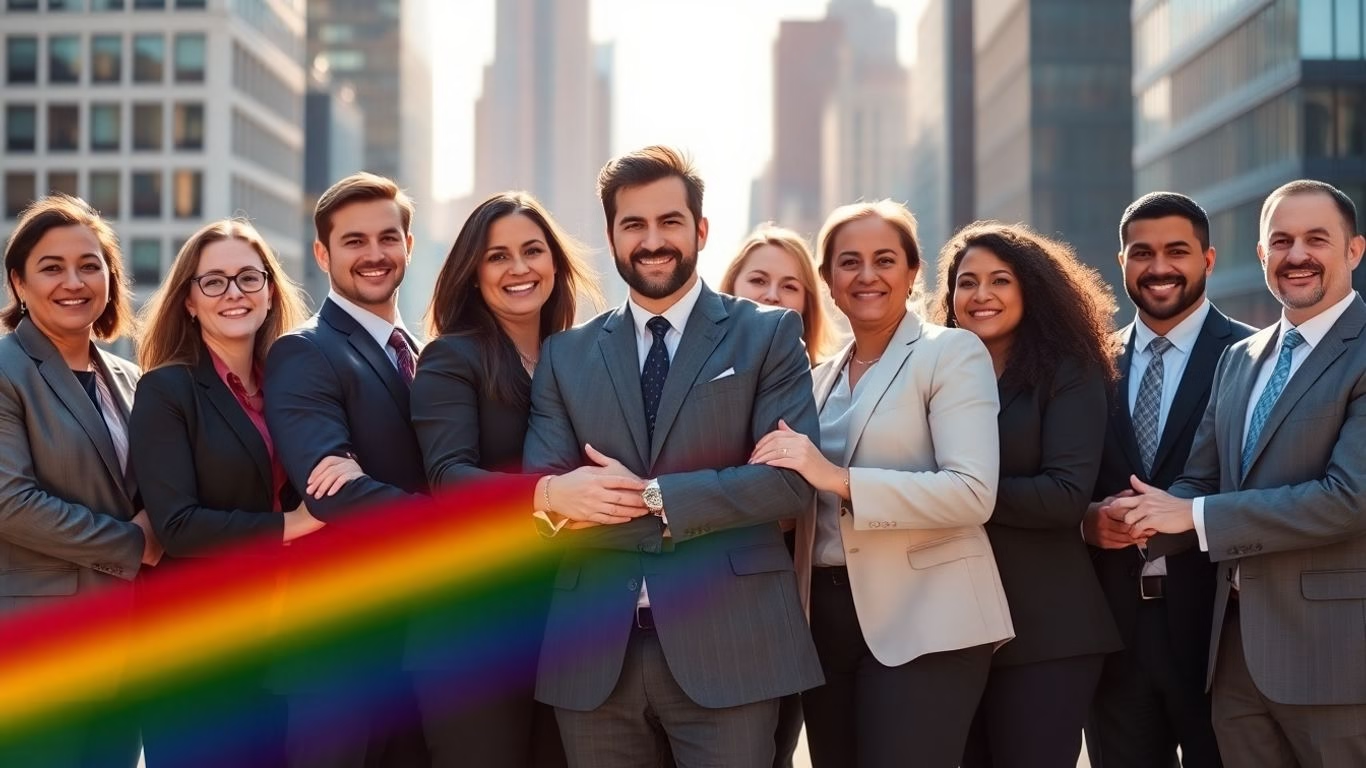
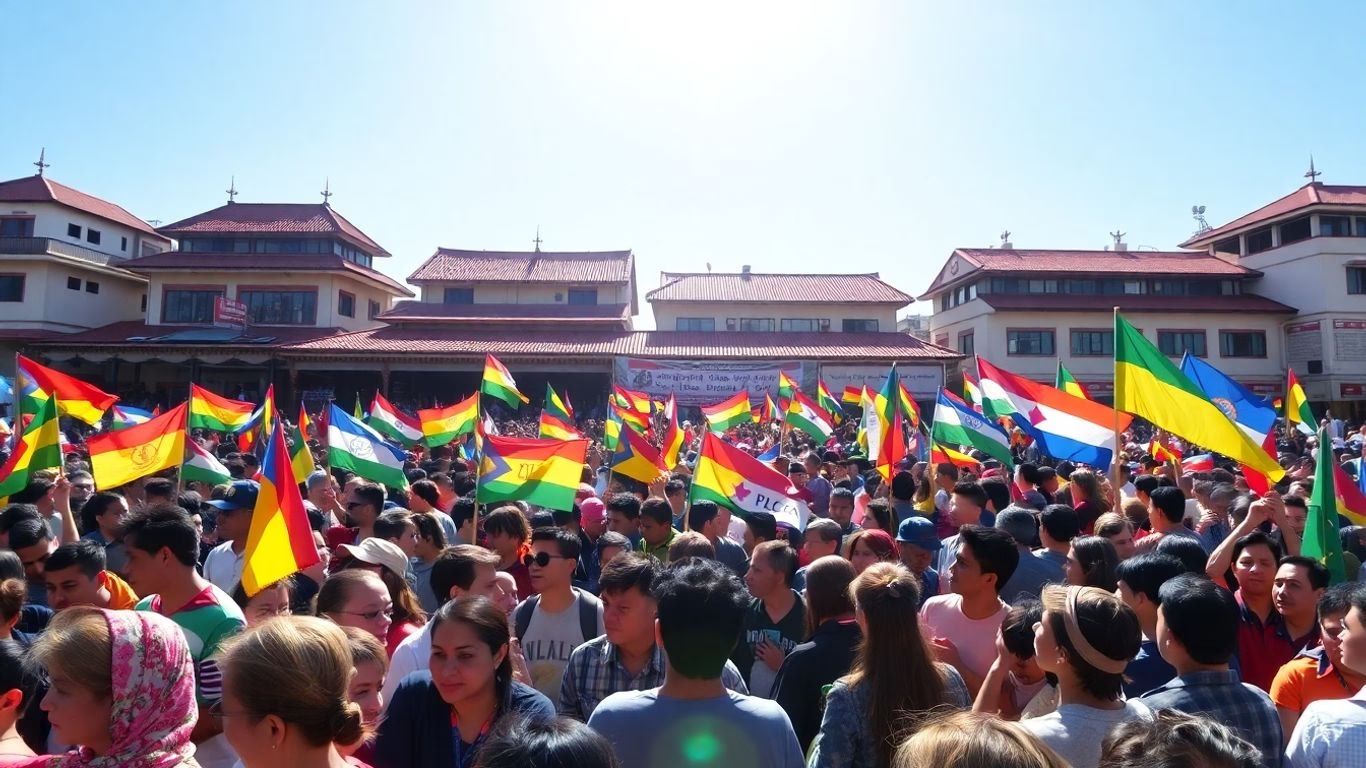
Leave a Reply